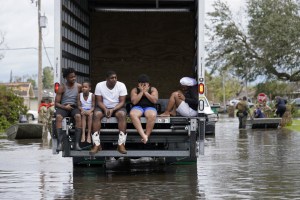
In this Monday, Aug. 30, 2021, file photo, people are evacuated from floodwaters in the aftermath of Hurricane Ida in LaPlace, La. A new report from the United Nations weather agency finds the world is getting several times more weather disasters than in the 1970s. (AP Photo/Gerald Herbert, File)
By Jessica Dortch and Reginald L. Allen II
Special to the AFRO
Hurricane Ida made landfall in Louisiana on Aug. 29, leaving one million people without power throughout parts of the Southeast and buildings damaged throughout the state. The hurricane was classified as a Category 4 before being demoted to a tropical storm once it moved inland. Still a torrential downpour with winds exceeding 150 mph, the aftermath has wrecked the City of New Orleans, ironically, the same day Hurricane Katrina struck 16 years ago.
Roads are blocked from fallen trees, power lines are down, buildings are destroyed and entire towns are completely flooded. Hundreds of thousands of Louisianans still remain without electricity and tap water, leaving residents with medical issues desperate for resources.
There have been a total of six deaths confirmed in three states, as of Sept. 1,, the first being a 60-year old man from the Baton Rouge area who was killed when a tree fell on his home, as the search for stranded residents continues.
Ramsey Green, deputy chief administrative officer for infrastructure, warned about the impending weather conditions. Green stated “If forecasts of up to 20 inches of rain prove true, the city’s underfunded and neglected network of pumps, underground pipes and surface canals likely won’t be able to keep up.”
As the Mid-Atlantic region braces for the remnants of the hurricane, in Maryland, residents in an apartment complex were forced to evacuate after severe flooding, leaving one teenager dead and another person missing.
Help us Continue to tell OUR Story and join the AFRO family as a member – subscribers are now members! Join here!
The post Hurricane Ida ravages New Orleans, leaves thousands without power, resources appeared first on AFRO American Newspapers .











